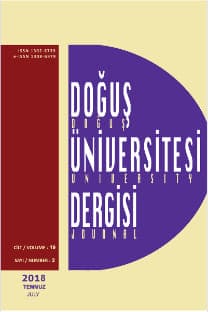Bilgi, Regülasyon ve Rekabet: Bir Piyasa Süreci Yaklaşımı
Knowledge, Regulation and Competition: A Market Process Approach
___
- ARROW, K.(1963). Uncertainty and Welfare Economics of Medical Care. American Economic Review, c. 53, 941-973.ss.
- BAUMOL, W. (1990). Entrepreneurship: Productive, Unproductive and Descriptive. Journal of Political Economy, c. 85, 893-921.ss.
- BENSON, B. (basılıyor). Regulation, More Regulation, Partial Deregulation, and Reregulation: The Disequilibrating Nature of a Rent-Seeking Society. Review of Austrian Economics.
- BUCHANAN, J. M. (1969). Cost and Choice, Chicago: Markham.
- -----. (1989). Explorations into Constitutional Political Economics, College Station, Texas: Texas A&M University Press.
- BUCHANAN, J. M. ve G. TULLOCK (1962). The Calculus of Consent, Ann Arbor, Michigan: University of Michigan Press.
- BOETTKE, P, (1994). Elgar Companion to Austrian Economics, New York: Elgar.
- COASE, R. (1960), "The Problem of Social Cost", Journal of Law and Economics, c. 3, 1-40.SS.
- DEMSETZ, H. (1969). Information and Efficiency: Another Viewpoint. Journal of Law and Economics, c. 12, 1-22.ss.
- FAULHABER, G. R. (1975). Cross-Subsidization: Pricing in Public Enterprises. American Economic Review, c. 65, 966-77.ss.
- HAYEK, F. A. (1948). Individualism and Economic Order, Chicago: University of Chicago Press.
- -----. (1978). Competition as a Discovery Procedure, idem, New Studies in Philosophy, Politics and Economics, Chicago: University of Chicago Press.
- HERTOG, J. den (2000). General Theories of Regulation. Encyclopedia of Law and Economics, 223-70.ss.
- IKEDA, S. (1990). Market-Process Theory and 'Dynamic' Theories of the Market. Southern Economic Journal, c. 57, 75-92.ss.
- JOSKOW, P. L. ve N. L. ROSE (1989). The Effects of Economic Regulation. R. Schmalensee ve R. D. Willig (der.), Handbook of Industrial Organization, c. 2 içinde, London: Elsevier, 1449-506.ss.
- KIRZNER, I. M. .(1973). Competition and Entrepreneurship, Chicago: Chicago University Press.
- -----, (1985). The Perils of Regulation: A Market-Process Approach. idem, Discovery and the Capitalist Process, Chicago: Chicago University Press.
- LAVOIE, D., (1985). Rivalry and Central Planning, Cambridge University Press. O'DRISCOLL, G. P. ve M. J. RIZZO (1996). The Economics of Time and Ignorance, London: Routledge.
- PELTZMAN, S. (1975). The Effects of Automobile Safety Regulations. Journal of Political Economy, c. 83, 677-725.ss.
- ----- . (1976). Toward a More General Theory of Regulation. Journal of Law and Economics,, c. 19, 21 1-40.ss.
- -----, (1989). The Economic Theory of Regulation after a Decade of Deregulation. Brookings Papers on Economic Activity, 1-41.ss.
- POSNER, R. A. (1974). Theories of Economic Regulation. Bell Journal of Economics and Management Science, c. 5, 335-58.ss.
- ----- . (1975). The Social Costs of Monopoly and Regulation. Journal of Political Economy, c. 83, 807-27.ss.
- PRIEST, G. L. (1993). The Origins of Utility Regulation and the 'Theories of Regulation' Debate. Journal of Law and Economics, c. 36, 289-323.ss.
- SHUGHART, W. F. (1995). Public Choice Theory and Antitrust Policy. F. McChesney and W. F. Shughart (der.), The Causes and Consequences of Antitrust içinde, Chicago: University of Chicago, 7-24.ss.
- STIGLER, G. J. (1971). The Theory of Economic Regulation. Bell Journal of Economics and Management Science, c. 2, 3-21.ss.
- TOLLISON, R. D. (1982), Rent Seeking: A Survey, Kyklos, c.35, 575-602.ss.
- TULLOCK, G. (1967). The Welfare Costs of Tariffs. Monopolies, and Theft, Western Economic Journal, c. 5, 224-32.ss.
- ----- . (1980). Rent-Seeking as a Negative Sum Game. J. Buchanan, R. Tollison ve G. Tullock (der.), Toward a Theory of the Rent-Seeking Society içinde, College Station: Texas A&M University Press.
- VAUGHN, K. I. (1994). Austrian Economics in America: The Migration of a Tradition, Cambridge: Cambridge University Press.
- WEINGAST, B. (1981). Regulation, Reregulation, and Deregulation: The Political Foundations of Agency Clientele Relationships. Journal of Law and Contemporary Problems, c. 44, 147-77.ss.
- ISSN: 1302-6739
- Yayın Aralığı: Yılda 2 Sayı
- Başlangıç: 2000
- Yayıncı: Doğuş Üniversitesi
Şirket Girişimciliğinin Şirket Performansına Etkileri
Lütfihak ALPKAN, ERCAN ERGÜN, Cagri BULUT, Cengiz YILMAZ
İletişimin İş Tatmini Üzerindeki Etkileri: Bir İşletmede Yapılan Görgül Çalışma
İLETİŞİMİN İŞ TATMİNİ ÜZERİNDEKİ ETKİLERİ : BİR İŞLETMEDE YAPILAN GÖRGÜL ÇALIŞMA
ŞİRKET GİRİŞİMCİLİĞİNİN ŞİRKET PERFORMANSINA ETKİLERİ
Lütfihak ALPKAN, Ercan ERGÜN, Çağrı BULUT, Cengiz YILMAZ
Harmonic Effects on Electromechanical Overcurrent Relays
K. Burak DALCI, RECEP YUMURTACI, Altuğ BOZKURT
Public Spending on Human Capital in Major Industrialized Countries
Tüketicilerin İnternet Bankacılığını Kullanmama Nedenleri Üzerine Bir Araştırma
BİLGİ, REGÜLASYON VE REKABET: BİR PİYASA SÜRECİ YAKLAIMI
BLOOM FİLTRELERİ : ÇEŞİTLERİ VE ANALİZİ
HARMONİKLERİN ELEKTROMEKANİK AŞIRI AKIM RÖLELERİ ÜZERİNDEKİ ETKİLERİ
